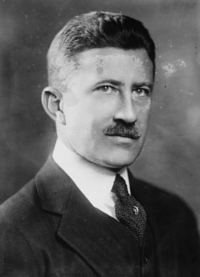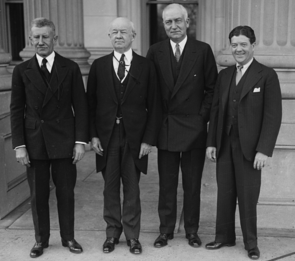Frederick Hale
 From Conservapedia
From Conservapedia | Frederick Hale | |||
|---|---|---|---|
| |||
| Former U.S. Senator from Maine From: March 4, 1917 – January 3, 1941 | |||
| Predecessor | Charles Johnson | ||
| Successor | Ralph Owen Brewster | ||
| Former State Representative from Maine From: 1905–1906 | |||
| Predecessor | ??? | ||
| Successor | ??? | ||
| Information | |||
| Party | Republican | ||
| Religion | Congregationalist[1] | ||
Frederick Hale (October 7, 1874 – September 28, 1963) was a Maine Republican who was as the state's U.S. senator from the late 1910s to the early 1940s, previously for a term in the lower state legislature. He came from a political dynasty, as both his father Eugene Hale and abolitionist maternal grandfather Zachariah Chandler were also senators.[2]
His cousin Robert S. Hale was also a state representative, and in addition represented Maine's 1st congressional district in the U.S. House of Representatives for eight consecutive terms.
Contents
Early life and career[edit]
Hale was born in Detroit, Michigan to the former Mary Douglass Chandler and Eugene Hale. After attending preparatory schools in Massachusetts and New Jersey, he enrolled in Harvard University, graduating in 1896. Hale then attended Columbia University, and practiced law in Portland, Maine after being admitted to the bar.
He had an older brother, Chandler Hale (1873–1951), and a younger brother, Eugene Hale, Jr. (1876–1932). The former was the Third Assistant Secretary of State under the presidency of William Howard Taft while the latter was a member of the New York Stock Exchange.[3]
Political career[edit]
Hale was from 1912 to 1918 a member of the Republican National Committee.
U.S. Senate[edit]
Hale was narrowly elected to the Senate in the 1916 elections,[4] and handily won re-election in 1922[5] and 1928.[6] In the latter race, he faced the KKK-backed governor Ralph Owen Brewster in the primary, though was easily nominated by a landslide.[7]
1910s and 20s[edit]
Hale opposed[8] and voted against[9] the Sedition Act of 1918 during the presidency of Woodrow Wilson. He also opposed the globalist League of Nations.[10]
During the presidency of Calvin Coolidge, a proposal was made by fellow Republican senator Reed Smoot of Utah to reduce the top income tax rate to 32%.[11] Although the majority of the GOP including Hale supported the measure, it was defeated in a 36–47 vote.[12] Hale also voted against an amendment introduced by the bigoted, racist North Carolina insurrectionist Furnifold Simmons[11] to raise the maximum income tax rate by 2.5%.[13]
FDR presidency[edit]
A fierce opponent of the liberal agenda during the presidency of Franklin D. Roosevelt, Hale resisted New Deal programs[10] at an even greater frequency than his Maine senatorial colleague Wallace H. White.[14] This includes his vote against the National Labor Relations Act (Wagner Act), which White supported.[15] Along with White in 1937, he was one of sixteen senators to vote against the confirmation of Klansman Hugo Black to the United States Supreme Court.[16]
Hale faced a strong challenge in the 1934 Midterm Elections; even though Maine was a strongly Republican state during the era, the Great Depression and resulting heavy backlash against the GOP proved to be formidable. He was only re-elected over Democrat opponent F. Harold Dubord by a margin of 0.43 percentage points.[17]
Hale retired from the Senate in 1940 and was succeeded by his intraparty foe Brewster. He missed 10% of all roll call votes during his tenure.[18] Throughout his career, he voted with the conservative side an average of 91% of the time, according to an ideology tracking method by FascinatingPolitics.com.[19]
Death[edit]
Hale died in late September 1963 at the age of eighty-eight. He is interred at Woodbine Cemetery, located in Ellsworth, Maine.
See also[edit]
- Clyde H. Smith, Republican congressman from Maine's 2nd congressional district
- William R. Pattangall, Democrat-turned-Republican who served in the Maine Supreme Judicial Court
- Frederick G. Payne, later Republican U.S. senator from Maine
References[edit]
- ↑ Index to Politicians: Hale. The Political Graveyard. Retrieved August 2, 2021.
- ↑ Hale, Frederick, 1874-1963. Social Networks and Archival Context. Retrieved August 2, 2021.
- ↑ February 17, 1933. EUGENE HALE JR. DIES IN HOSPITAL; Retired Broker Was a Brother of U.S. Senator Frederick Hale of Maine. HARVARD LAW GRADUATE He Was a Member of the New York Stock Exchange More Than 20 Years.. The New York Times. Retrieved August 19, 2021.
- ↑ ME U.S. Senate Race - Sep 11, 1916. Our Campaigns. Retrieved August 2, 2021.
- ↑ ME US Senate Race - Sep 11, 1922. Our Campaigns. Retrieved August 2, 2021.
- ↑ ME US Senate Race - Sep 10, 1928. Our Campaigns. Retrieved August 2, 2021.
- ↑ ME US Senate - R Primary Race - Jan 18, 1928. Our Campaigns. Retrieved August 2, 2021.
- ↑ FascinatingPolitics (April 14, 2018). The Sedition Act: Opposed by Republicans!. Mad Politics: The Bizarre, Fascinating, and Unknown of American Political History. Retrieved August 2, 2021.
- ↑ TO AGREE TO H.R. 8753 (STAT-40-L-553, 5/16/18), A BILL AMENDING AN ACT PUNISHING ACTS O F INTERFERENCE WITH FOREIGN RELATIONS, NEUTRALITY, FOREIGN COMMERCE AND ESPIONAGE, AND TO BETTER ENFORCE CRIMINAL LAWS. (P. 6057-1).. GovTrack.us. Retrieved August 2, 2021.
- ↑ 10.0 10.1 September 29, 1963. Frederick Hale Is Dead at 88; Senator From Maine, 1916-41; Was Top-Ranking Republican --Favored Big Navy, Fought League and New Deal Signed Lodge Resolution Opposed Roosevelt Harvard '96 Graduate. The New York Times. Retrieved August 2, 2021.
- ↑ 11.0 11.1 FascinatingPolitics (July 25, 2018). Racism and Tax Cuts…Are They Really Peas in a Pod?. Mad Politics: The Bizarre, Fascinating, and Unknown of American Political History. Retrieved August 19, 2021.
- ↑ TO AMEND, IN THE NATURE OF A SUBSTITUTE, H.R. 6715, BY MAKING THE MAXIMUM SURTAX RATE 32 PER CENT.. GovTrack.us. Retrieved August 19, 2021.
- ↑ TO AGREE TO THE AMENDMENT TO H.R. 6715, WHICH AMENDMENT PROVIDES THAT THE MAXIMUM RATE ON INCOMES BE 40 PER CENT INSTEAD OF 37 1/2 PER CENT. (P. 8195-2).. GovTrack.us. Retrieved August 19, 2021.
- ↑ FascinatingPolitics (September 23, 2018). How the Northeast Became Democratic, Part IV: Maine (Sort of). Mad Politics: The Bizarre, Fascinating, and Unknown of American Political History. Retrieved August 2, 2021.
- ↑ TO PASS S. 1958, A BILL TO PROVIDE FOR SETTLEMENT OF LABOR DISPUTES.. GovTrack.us. Retrieved August 2, 2021.
- ↑ TO CONFIRM THE NOMINATION OF HUGO BLACK TO BE ASSOCIATE JUSTICE OF THE SUPREME COURT.. GovTrack.us. Retrieved August 2, 2021.
- ↑ ME US Senate Race - Sep 10, 1934. Our Campaigns. Retrieved August 2, 2021.
- ↑ Sen. Frederick Hale. GovTrack.us. Retrieved August 2, 2021.
- ↑ FascinatingPolitics (May 3, 2020). Versailles Treaty, in Six Key Votes. Mad Politics: The Bizarre, Fascinating, and Unknown of American Political History. Retrieved August 19, 2021.
External links[edit]
Categories: [Maine] [Michigan] [Republican Party] [State Representatives] [Former United States Senators] [Conservatives] [New Deal] [Patriots] [Congregationalists]
↧ Download as ZWI file | Last modified: 02/21/2023 20:43:17 | 14 views
☰ Source: https://www.conservapedia.com/Frederick_Hale | License: CC BY-SA 3.0
 ZWI signed:
ZWI signed:


 KSF
KSF